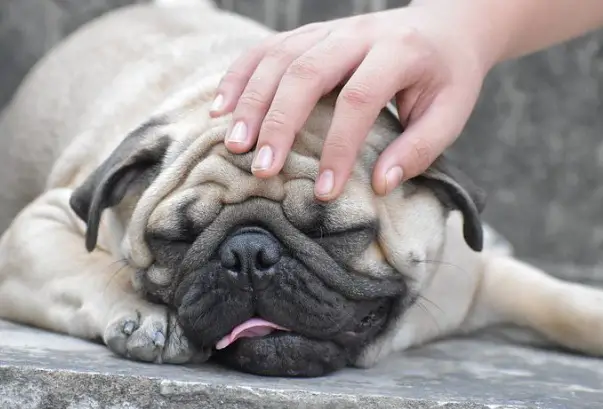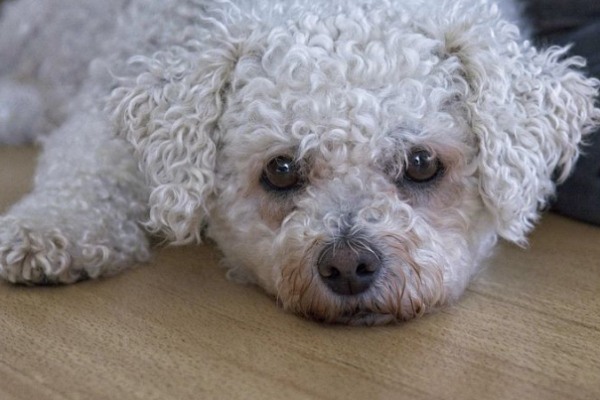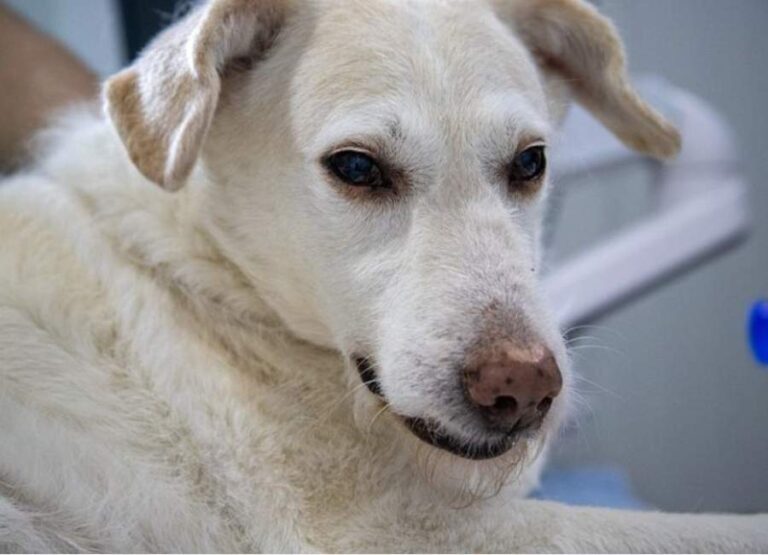16 French Bulldogs Health Problems Control & Preventions

In this, we will be discussing all the common French Bulldogs health problems that have been linked or associated with Frenchies in the pasted and present.
Do not offer self-treatments to your French Bulldog, always contact your vet. For this reason, I didn’t add treatment to each health problem.
From my research, most of the health challenges have similar symptoms, therefore scroll down to the end to see the general symptoms of a sick Frenchie.
Frenchies rank in the top 10 most popular breeds in the U.S., which is partly due to their adorable, puppy-like appearance.
Some of the French Bulldog’s temperament and health issues can be linked to their appearance.
French Bulldogs are a beloved, lovable breed. And while they are affectionate, playful, and adorable, there are some downsides to owning this breed.
One downside is that French Bulldogs can suffer from different health problems.
There are many illnesses and symptoms that French Bulldogs can experience.
Read more about: The Ultimate Guide on how to care for a French Bulldog.
French Bulldogs Health Problems
Here are the common French Bulldogs health problems that have been linked to French Bulldogs:
Hip Dysplasia
Hip dysplasia in French Bulldogs is the medical term for a hip socket that doesn’t fully cover the ball portion of the upper thighbone.
This allows the hip joint to become partially or completely dislocated. Most Frenchies with hip dysplasia are born with the condition.
Hip Dysplasia is one of the major French Bulldog problems, so always keep an eye on your Frenchie.
Symptoms of Hip Dysplasia in French Bulldogs
Here are some common symptoms of hip dysplasia in French Bulldogs;
- Difficulty in climbing
- Decreased jumping
- Decreased activity
- Hip pains
- Difficulty in walking
Ear infections
Because French Bulldogs’ ear canals are so small, they are susceptible to ear infections.
They are also prone to allergies, which might cause them to develop these diseases.
To fight infections, ear glands enlarge and generate more wax than usual.
This causes an excess of ear tissue to be produced, narrowing and inflaming the canal.
The eardrum might burst in severe situations, creating a lot of discomfort for your dog!
Excessive ear scratching and redness inside the ear are red flags that this is an issue.
Reproductive Problems
French Bulldogs often have reproductive issues. They should be seen by a veterinarian to check if they are in fetal distress.
Over 85% of Frenchies can’t give birth on their own because of their narrow hips, therefore C-section is always recommended.
Reproductive issues are one of the top French Bulldog problems and why they are very expensive.
Heat Stress
One of the most prevalent illnesses affecting French Bulldogs is heat stress.
They have a hard time breathing and controlling their body temperatures because of their smashed faces.
If you live in a hotter climate, it’s even more vital to keep an eye on your French Bulldog for signs of heat stress.
Heat stress can progress to heat stroke if left untreated.
Cherry Eye
Cherry eye is a disorder of the nictitating membrane (NM), also called the third eyelid, present in the eyes of dogs and cats.
Cherry eye is most often seen in young dogs under the age of two. This defect causes the gland to prolapse and protrudes from the eye as a red fleshy mass.
Cherry eye is one of the top French Bulldog problems but is easy to treat with the help of your vet.
Conjunctivitis
Because of their genetic composition, French Bulldogs are at a greater risk of developing conjunctivitis.
This is due to the fact that they are a brachycephalic (short-nosed) breed.
Bacterial and viral infections, as well as allergic responses to chemicals, are the most common causes.
If your Frenchie starts blinking more than normal or has mucus, pus, or discharge seeping from their eyes, you should be concerned.
Elongated Soft Palate
An elongated soft palate is a congenital hereditary disorder that negatively affects dogs and cat’s breathing and eating.
The soft palate is the soft tissue that runs along the rear of the mouth’s roof.
This tissue becomes too long for the head in dogs with an extended soft palate, and it can obstruct the windpipe’s entry.
Many French Bulldogs are born with an elongated soft palate, which is a symptom of Brachycephalic Syndrome.
It might make it harder for your French Bulldog to breathe.
A soft palate is considered elongated when it extends past the top of the epiglottis and/or past the middle of the tonsillar crypts.
Food Allergies
French Bulldogs can develop food allergies. Allergies are one of the major French Bulldog problems.
This usually occurs as a result of the breed’s tender palatine membrane, which will make them an easy target for allergens.
This problem is easy to treat, with a few drops of antihistamine applied to the face.
Medications
French Bulldogs often get a fungal infection of the skin and the mouth or can develop various lumps on their bodies, which are more common in larger breeds.
Symptoms of food allergies in French Bulldogs
Here are symptoms of food allergies in French Bulldogs,
- Scabbed skin
- Itchy and red skin
- Increased Sneezing
- Itchy ears
- Runny eyes
- Swollen paws
- Paw chewing
French Bulldogs have a massive following and a number of people all over the world have fallen head-over-heels for the breed.
There are a number of health issues that French Bulldogs may have but they are easily manageable.
They are not serious and will usually improve if left on their own.
A fattened-up breed is an overweight one and the problems that this can cause are obesity, diabetes, and cancer.
Fattened-up breeds of dogs also face the risk of pressure sores, as the pads of their feet are usually over-developed.
Neurological Problems
French Bulldogs have a high rate of spinal problems, it is not uncommon for a small breed dog to develop problems in the spine and hips.
It can be for one of two reasons – either for a congenital condition or for an injury and then weakened muscles to compensate.
These problems will usually resolve with time, but they will make walking difficult and, if serious, will need to be addressed in the owner’s home by a Vet.
Endocrine Problems
Endocrine problems are just one of the health issues that come with the French Bulldog breed.
Many young puppies and adult dogs develop endocrine issues.
Their digestive system and reproductive systems will sometimes go haywire and if left untreated, this condition could become very serious.
Some of these can be fairly easily managed, but they can be distressing for owners as they can vary in severity.
Bladder Stones
These painful, rock-like kidney stones often form on the bladder and pass unnoticed until they have turned into a stone.
Cardiovascular Problems
French Bulldogs have a tendency to be tall and with a deep chest and this makes them prone to developing heart problems.
All breeds of dogs can develop heart problems, but it is most likely that a large breed such as a bulldog will be more at risk.
French Bulldogs also tend to have enlarged heart chambers, which can add to the problem.
What to do: If you feel your French bulldog has a heart problem, it is best to take it to the vet to have it checked out.
Some breeds have a lower predisposition to developing heart problems than others.
However, if your dog is older than four months of age, then you should be aware that your dog may be at a higher risk of developing heart problems.
For many dog owners, it is frightening to hear the words “heart murmur”, as it could be an early sign of serious underlying issues.
Although not common, it can be a sign that an underlying issue is affecting the heart.
Your dog’s heart can be tested by a checkup with a vet, an examination by your dog’s Pedigree, or a blood test from a Vet.
Respiratory Or breathing problems
Because of their small noses, French Bulldogs are prone to upper respiratory tract infections.
These things happen to every bulldog at some point in their life, and they’re contagious, so they’ll happen if your dog spends more time with other dogs.
The symptoms are similar to those of cold in humans: nasal congestion, coughing, and tiredness.
It is fairly common for French Bulldogs to have breathing difficulties, as their cute faces fit perfectly into their already adorable faces.
When a French Bulldog has breathing difficulties, it is best to contact a veterinarian immediately.
Your veterinarian will be able to advise you on how to improve your French Bulldog breathing which is a major French Bulldogs health problems.
General Vomiting
The first thing you should do if your French Bulldog has been vomiting is given them a little food and water.
Most often, they will pass it shortly after. If they are having prolonged episodes of vomiting, it is best to contact a veterinarian.
Coughs and Colds
Frenchies suffer from colds and coughs more than other breeds.
At the same time, they are prone to separation anxiety as one of the French Bulldog problems
If your dog has a cough, it is recommended that you take him to the vet, and be aware that the symptoms can last up to 6 months.
Creams and Ointments
Frenchies are prone to getting ingrown hair. It is advised that you do not shave their faces, necks, or backs.
Instead, use a cream to treat the area, and leave it on for 5 minutes.
If your dog struggles to tolerate these products, leave them off.
Gastrointestinal Problems
Gastrointestinal problems in French Bulldogs are more common if they are not kept out of the sun.
Brushing and keeping them out of the sun will reduce the likelihood of infection.
My friend Fluffy has a problem with her digestive system. She has had some pretty major issues in the past.
It has caused her issues all her life, but she was able to work through them and go into remission for some time. The damage has been done, though.
In order to try and clear her stomach, jack my friend was are giving her medication.
Surgery is a scary option for a dog. She is a great dog, even though she has had some health issues.
We are hoping that the medication and her time at this foster home will help clear her up.
Skin Problems
Frenchies have slightly thicker skin that makes them prone to developing skin cancer.
They have also been known to develop sores and scabs. Over-cleaning and grooming their coats may also cause skin irritation.
Dermatitis can occur as a result of the folded facial skin around the snout and nose of French Bulldogs.
It can also happen in other folded regions of their bodies, such as armpits, necks, and crotches.
Constant itching, biting, and scratching of the afflicted region, as well as redness and ulcers on the skin, are all symptoms of this condition.
Dermatitis may be avoided by keeping skin folds dry and clean.
Most of these issues can be fixed by visiting a skin specialist. Skin problem is one of the French Bulldog problems.
How To Prevent Or Control French Bulldog Health Problems
Now that you know what health issues a French Bulldog can be prone to, we have provided you with a list of ways to help your French Bulldog overcome these.
Parasite Control
Be sure you provide a good environment for your French Bulldog as they are prone to parasite attacks.
Keep away all forms of worms, always watch your Frenchie eat, and be sure he does not eat grass with early morning dew.
Monitor Diet
Most of the unnecessary health challenges a French Bulldog will have comes from diet.
Feeding the wrong food will cost you more money and time, so be sure to check with your vet before switching food.
If your French Bulldog is on a diet, make sure to feed him the right foods. Avoid the following:
- Low-quality meats and greasy foods
- Always buy store-bought food
- Mixed treats like bacon, sausage, fish, and cheeses
- Fried and fried foods
- Soda and alcohol
Exercise
As with all dog breeds, exercise is a necessity. Walking is good but you must avoid long-distance walks which could be dangerous for your dog.
You can use short walks to find your dog’s personality and then gradually increase the distance.
To keep your dog fit, ensure that he is given several hours daily of exercise. Just like you, he needs to breathe fresh air and exercise.
Brush Your Dog
Brushing your French Bulldog is essential if he has coat fluff. Brushing your dog regularly helps to remove dead or tangled hair from his coat.
If he is on a diet, you should brush his coat when he is relaxed or feeling more playful.
It is advisable to also brush him while he is not feeling energetic to get rid of any trapped hair.
Keep brushing your dog with the longer bristles as they should reach all the way to his skin.
If you’re unable to reach all of the hair, then use a special tool that can get into crevices.
Brushing your French Bulldog every day can keep his coat clean and also help to keep his skin smooth.
Brushing his coat also makes sure that you’re able to pick out any skin problems.
Clean Feces
It is crucial that your dog has frequent visits to the toilet. This means that you should not leave him unsupervised for long periods of time.
Always clean up to the toilet and make sure you clean your French Bulldog butts, as bacteria pathogens can grow there.
Make sure that you check that he has gone at least twice a day.
Most French Bulldogs do not require daily walks. However, it is crucial that you walk your dog at least once a day to help keep his coat clean and his skin moisturized.
French Bulldogs also love being around their owners. This can make taking him for a walk more fun for both of you.
Avoid Over-Feeding
The reason for your dog being overweight is due to over-feeding. You should avoid giving your dog large portions of food as this can cause bloating and excess fat. You should also avoid feeding your dog too many treats.
Don’t Give Your Dog Alcohol
As with most dogs, French Bulldogs have problems digesting alcohol, so never bring alcoholic drinks close to your French Bulldog.
Alcohol may tend to cause French Bulldogs to become gassier and this will lead to unnecessary health challenges.
Mixes Make for Trouble
Get a purebred French Bulldog and avoid so many unnecessary health challenges.
Puppies are very much a product of the environment they’re born into, and what they’re exposed to has a big impact on their growth, behavior, and health.
For example, female French bulldogs are often bred with mini bulls, which are over two times as big.
That means that some female Frenchies are born double the size of their littermates and have a hard time getting their bodies to form correctly, so they develop bowel and urinary problems.
Another problem is that many French bulldogs end up with non-specific genital hernias that aren’t being dealt with in their puppyhood.
As they get older, it’s also common for them to have cancers like mammary gland cancer and prostate cancer.
Invest in Pest Control
Keep pests away from your French Bulldog as they are prone to pest attack.
Try to keep your home clean to avoid lice, ticks, etc
You’ll Have to Clean a Little More
French bulldogs get messy, so do their parents and siblings. For starters, they’re messy eaters, meaning that a lot of their food goes everywhere else rather than in their mouths.
They also enjoy chewing on their beds and furniture and licking their paws.
General Symptoms Of a Sick French Bulldog
Here are all the symptoms associated with a sick French Bulldog;
- Weight loss
- Loss of appetite
- Increased appetite
- Increased thirst
- Thickening of the skin
- Increased urination
- Enlargement of the thyroid gland
- Vomiting
- Diarrhea
- An increased amount of stool
- Congestive heart failure
- Obesity
- Cold intolerance
- Tachycardia (fast heart rate)
- Heart murmurs
- Slow growth
- Cardiomegaly (enlarged heart)
- Runny nose
- Nosebleeds
- Blood in the feces
- Bloody urine
- Bleeding from the gums
- Coughing
- Dyspnea (shortness of breath)
Do not give self-medication to your French Bulldog, always contact your vet.
Always check for any of the above-mentioned symptoms. Read more on details of this French Bulldog’s sick symptoms.
Do french bulldogs have breathing problems
Researches found that more than half of French bulldogs have significant breathing problems, with over 66 percent showing stenotic nares or excessively tight nostrils.
Therefore, do not let your French Bulldog stay in an airtight environment.
Here are some interesting topics:
- 46 Pros And Cons Of French Bulldogs You Should Know.
- 35 Top Facts About French Bulldogs You Should Know.
- 12 Top Tips On How To Potty Train A French Bulldog
- 11 Top Reasons Why French Bulldogs Are So Expensive.
- What Fruits Can French Bulldogs Eat: 8 Top Fruits & Benefits.


![Are Seizures Common in Beagles [Causes, Signs & Treatments] Are Seizures Common In Beagles](https://petcreeks.com/wp-content/uploads/2021/04/Are-Seizures-Common-In-Beagles.jpg)



![Deafness in Dogs [Causes, Signs & Living With a Deaf Dog] Deafness in Dogs](https://petcreeks.com/wp-content/uploads/2023/09/pexels-mikhail-nilov-7469222.jpg)